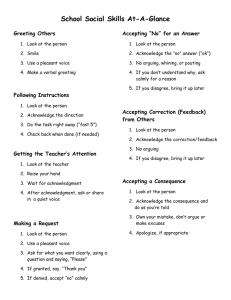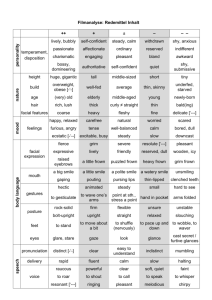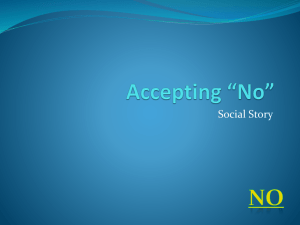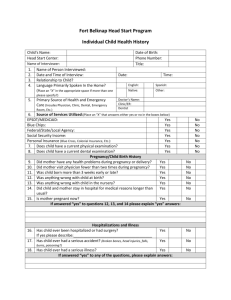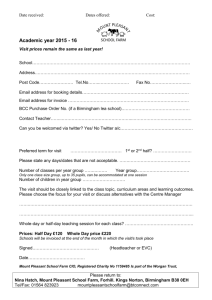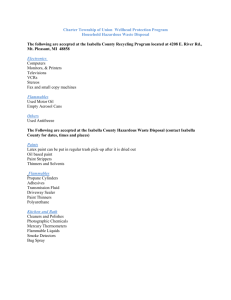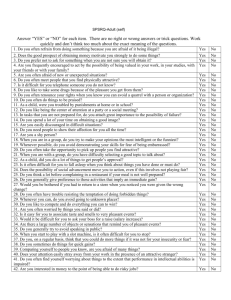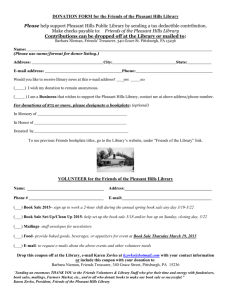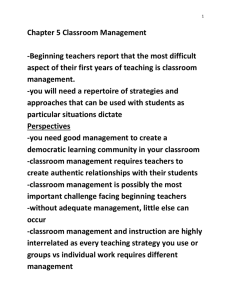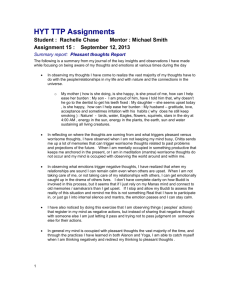Boys Town Social Skills: Classroom Guide for Kids
advertisement
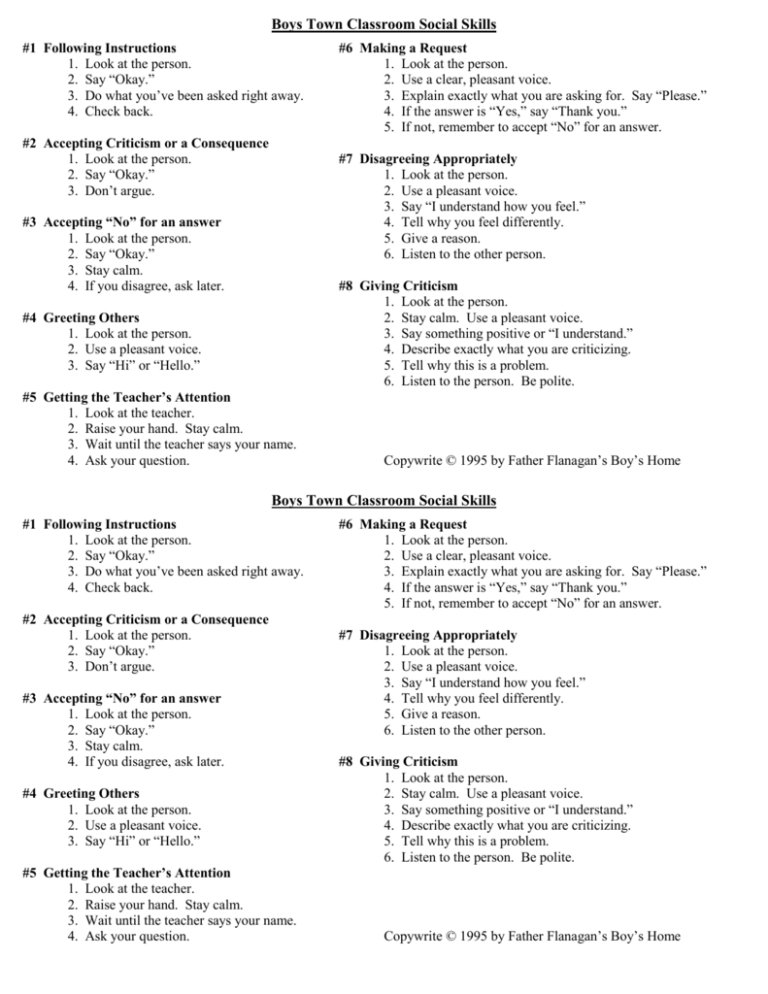
Boys Town Classroom Social Skills #1 Following Instructions 1. Look at the person. 2. Say “Okay.” 3. Do what you’ve been asked right away. 4. Check back. #2 Accepting Criticism or a Consequence 1. Look at the person. 2. Say “Okay.” 3. Don’t argue. #6 Making a Request 1. Look at the person. 2. Use a clear, pleasant voice. 3. Explain exactly what you are asking for. Say “Please.” 4. If the answer is “Yes,” say “Thank you.” 5. If not, remember to accept “No” for an answer. #7 Disagreeing Appropriately 1. Look at the person. 2. Use a pleasant voice. 3. Say “I understand how you feel.” 4. Tell why you feel differently. 5. Give a reason. 6. Listen to the other person. #3 Accepting “No” for an answer 1. Look at the person. 2. Say “Okay.” 3. Stay calm. 4. If you disagree, ask later. #8 Giving Criticism 1. Look at the person. 2. Stay calm. Use a pleasant voice. 3. Say something positive or “I understand.” 4. Describe exactly what you are criticizing. 5. Tell why this is a problem. 6. Listen to the person. Be polite. #4 Greeting Others 1. Look at the person. 2. Use a pleasant voice. 3. Say “Hi” or “Hello.” #5 Getting the Teacher’s Attention 1. Look at the teacher. 2. Raise your hand. Stay calm. 3. Wait until the teacher says your name. 4. Ask your question. Copywrite © 1995 by Father Flanagan’s Boy’s Home Boys Town Classroom Social Skills #1 Following Instructions 1. Look at the person. 2. Say “Okay.” 3. Do what you’ve been asked right away. 4. Check back. #2 Accepting Criticism or a Consequence 1. Look at the person. 2. Say “Okay.” 3. Don’t argue. #3 Accepting “No” for an answer 1. Look at the person. 2. Say “Okay.” 3. Stay calm. 4. If you disagree, ask later. #4 Greeting Others 1. Look at the person. 2. Use a pleasant voice. 3. Say “Hi” or “Hello.” #5 Getting the Teacher’s Attention 1. Look at the teacher. 2. Raise your hand. Stay calm. 3. Wait until the teacher says your name. 4. Ask your question. #6 Making a Request 1. Look at the person. 2. Use a clear, pleasant voice. 3. Explain exactly what you are asking for. Say “Please.” 4. If the answer is “Yes,” say “Thank you.” 5. If not, remember to accept “No” for an answer. #7 Disagreeing Appropriately 1. Look at the person. 2. Use a pleasant voice. 3. Say “I understand how you feel.” 4. Tell why you feel differently. 5. Give a reason. 6. Listen to the other person. #8 Giving Criticism 1. Look at the person. 2. Stay calm. Use a pleasant voice. 3. Say something positive or “I understand.” 4. Describe exactly what you are criticizing. 5. Tell why this is a problem. 6. Listen to the person. Be polite. Copywrite © 1995 by Father Flanagan’s Boy’s Home #9 Resisting Peer Pressure #13 Accepting Compliments 1. Look at the person. 1. Look at the person. 2. Use a calm voice. 2. Use a pleasant voice. 3. Say clearly that you do not want to participate. 3. Say “Thank you.” 4. Suggest something else to do. 4. Don’t look away, mumble, or deny the compliment. 5. If necessary, continue to say “No.” 5. Do not disagree with the compliment. 6. Leave the situation. #14 Volunteering #10 Making an Apology 1. Look at the person. 1. Look at the person. 2. Use a pleasant, enthusiastic voice. 2. Use a serious, sincere voice. 3. Ask if you can help. Describe the activity or task you 3. Say “I am sorry for…” or “I want to apologize for…” are offering to do. 4. Don’t make excuses. 4. Thank the person. 5. Explain how you plan to do better in the future. 5. Check back when you have finished. 6. Say “Thanks for listening.” #15 Reporting other Youth’s Behavior #11 Talking with Others 1. Look at the teacher or adult. 1. Look at the person. 2. Use a calm voice. Ask to talk to him or her privately. 2. Use a pleasant voice. 3. Describe the inappropriate behavior you are reporting. 3. Ask questions. 4. Explain why you are making the report. 4. Don’t interrupt. 5. Answer any questions the adult has. 6. Thank the adult for listening. #12 Giving Compliments 1. Look at the person. #16 Introducing Yourself 2. Smile. 1. Look at the person. Smile 3. Speak clearly and enthusiastically. 2. Use a pleasant voice. 4. Tell the person exactly what you like. 3. Offer a greeting. Say “Hi, my name is…” 4. Shake the person’s hand. 5. When you leave, say, “It was nice to meet you.” #9 Resisting Peer Pressure #13 Accepting Compliments 1. Look at the person. 1. Look at the person. 2. Use a calm voice. 2. Use a pleasant voice. 3. Say clearly that you do not want to participate. 3. Say “Thank you.” 4. Suggest something else to do. 4. Don’t look away, mumble, or deny the compliment. 5. If necessary, continue to say “No.” 5. Do not disagree with the compliment. 6. Leave the situation. #14 Volunteering #10 Making an Apology 1. Look at the person. 1. Look at the person. 2. Use a pleasant, enthusiastic voice. 2. Use a serious, sincere voice. 3. Ask if you can help. Describe the activity or task you 3. Say “I am sorry for…” or “I want to apologize for…” are offering to do. 4. Don’t make excuses. 4. Thank the person. 5. Explain how you plan to do better in the future. 5. Check back when you have finished. 6. Say “Thanks for listening.” #15 Reporting other Youth’s Behavior #11 Talking with Others 1. Look at the teacher or adult. 1. Look at the person. 2. Use a calm voice. Ask to talk to him or her privately. 2. Use a pleasant voice. 3. Describe the inappropriate behavior you are reporting. 3. Ask questions. 4. Explain why you are making the report. 4. Don’t interrupt. 5. Answer any questions the adult has. 6. Thank the adult for listening. #12 Giving Compliments 1. Look at the person. #16 Introducing Yourself 2. Smile. 1. Look at the person. Smile 3. Speak clearly and enthusiastically. 2. Use a pleasant voice. 4. Tell the person exactly what you like. 3. Offer a greeting. Say “Hi, my name is…” 4. Shake the person’s hand. 5. When you leave, say, “It was nice to meet you.”
